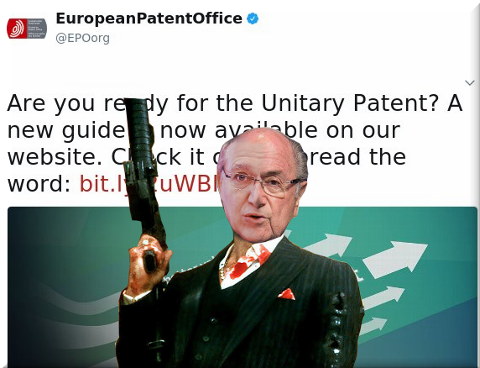Aggressive management style injured not only the Office but also the EU

Summary: Press coverage regarding the cause for Germany's decision to halt UPC ratification, with suspension pending in part owing to the serious abuses in Munich and Berlin
THIS morning we learned through a couple of people [1, 2] that the "UPC guide [is] now published." (in HTML at epo.org)
This was expected as the
EPO published a PDF a few days ago and today (a couple of hours ago) it
said: "Are you ready for the Unitary Patent? A new guide is now available on our website. Check it out & spread the word..."
"The UPC is not happening however," I told them. "It's stuck in part due to abuses of the EPO..."
Of course the EPO would simply ignore reality, just like some (in)famous European leaders. When the facts are not convenient, ignore, ignore, ignore.
The British media, much as expected, now explains why the UPC isn't happening. Yes, EPO abuses have a lot to do with it and yesterday morning it was
summarised by
The Register. To quote some portions:
The German federal court has finally revealed why it ordered a halt to the ratification of the Europe-wide Unitary Patent Court.
The Federal Constitutional Court (FCC) unexpectedly slammed the brakes on the UPC back in June, sparking speculation in the intellectual property world as to why – was it a procedural matter? Was it due to Brexit? Or was it because of reforms at the European Patent Office (EPO)?
To which the answer is: yes, yes and yes.
Top German IP lawyer Thorsten Bausch has been chasing the FCC on the matter and last week it responded to a formal request for information with some details.
[...]
Specifically, a two-thirds majority of the Bundestag would have been needed to pass the legislation. But what happened when the UPC law was passed was that there were insufficient numbers of Bundestag members voting to meet this level of agreement.
The second and third claimed violations directly concern the EPO, which has been subject to a number of highly controversial changes by EPO president Benoit Battistelli.
As we have reported previously, some of those changes were forced through as part of Battistelli's feud against a patent examiner who was a critic of his reforms.
Battistelli fired the examiner, who was also a member of the Boards of Appeal, in a highly dubious manner, using "evidence" from a special investigative unit. The subsequent disciplinary process has been widely criticized for failing to follow its own rules, repeatedly changing the details of the complaint, and refusing to allow the examiner to argue his case.
The EPO also leaked the disturbing – and entirely unproven – claim that "Nazi memorabilia" had been found at the examiner's office.
The examiner's five-year position on the Boards of Appeal is designed to be independent from EPO management. So before removing him, it decided to carry out an investigation into the matter rather than simply rubberstamp Battistelli's decision.
This more or less confirms everything we have said before. Among the
comments we have: "So, in other words... Batty Stella's abuses to position himself for the top job are the exact reason why he will never get the top job. I'm shocked, shocked, I tell you by such an astonishing amount of sanity, in politics no less."
Another person said: "Is it too much to hope that this will bring the whole saga to an end? Probably."
"Yes in 2018 when his term is up," said the next comment. "I think I can predict the date," said the next comment. "Remind me. When is Battistelli's term up?"
We actually see a lot of comments in there that are not about the EPO. Quite a few comments are about the EU even though the EPO is not an EU thing; the UPC
is.
We don't expect Bristows to say much about it; they just simply ignore anything that doesn't suit them or simply spin it wildly (as they have, albeit briefly).
The EPO is currently under fire if not
on fire, but Kilburn & Strode LLP looked at minor details yesterday when
Abi Heath wrote about the EPO Board of Appeal -- the very basis of the EPO's biggest constitutional abuse:
An EPO Board of Appeal left the pharmaceutical sector much to ponder in February this year when it confirmed an earlier EPO Opposition Division’s decision to revoke Bristol-Myers Squibb’s European patent EP1169038 on the ground of a lack of inventive step (T488/16).
This has raised eyebrows for generics and big pharma alike, as many would have predicted that the subject of the patent, dasatinib (Sprycel€®), would be safe from revocation, protected as it was by a single narrow claim to the commercially successful cancer drug.
Right now in the US they have a similar fear over revocation by PTAB -- a subject we'll explore in the next post. Given the incredible amount of bogus patents granted under Battistelli, no wonder he is so afraid of the EPO Boards of Appeal (especially any
independent EPO Board of Appeal); they would quickly reveal what a farce patent quality has been reduced to.
EPs are no longer worth very much; the same would go for unitary patents. We don't expect this system to get anywhere as even
national patents are probably worth more by now. They also cost a lot less and comments in Thorsten Bausch's blog suggest that the Spanish patent office now does a better job than the EPO.
⬆

